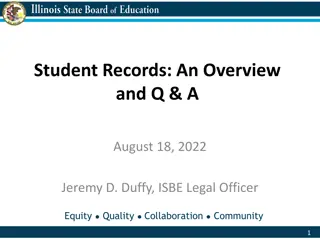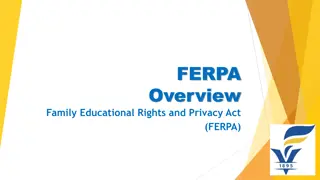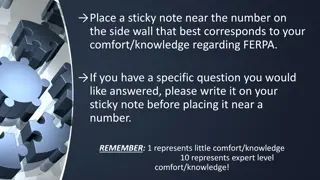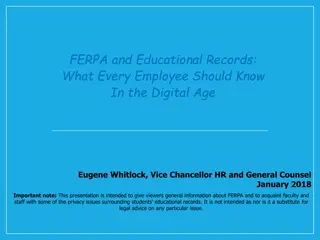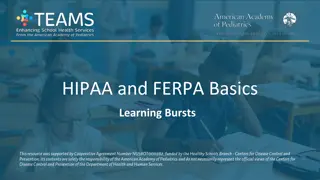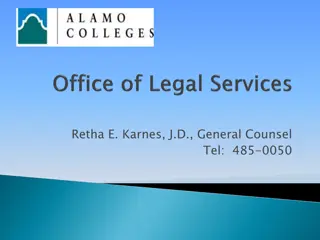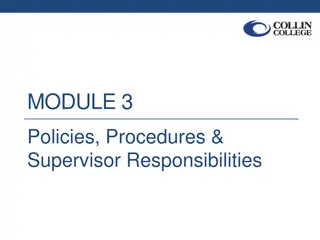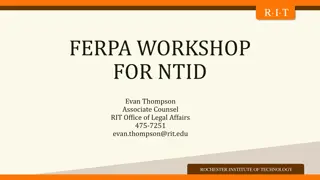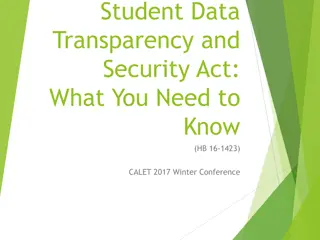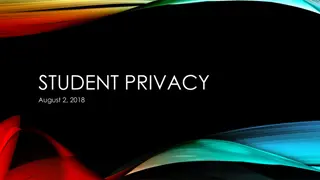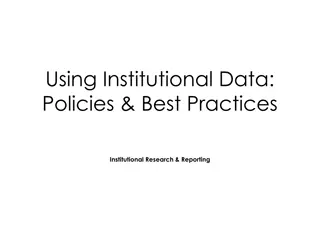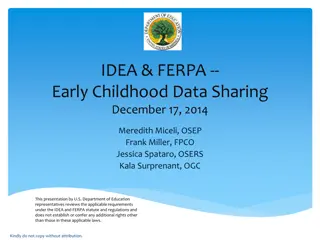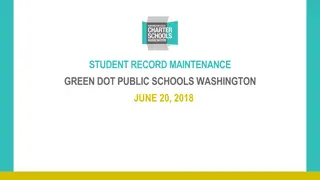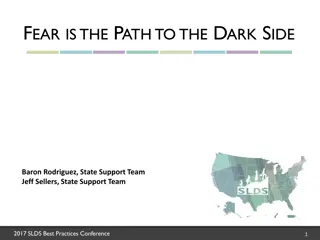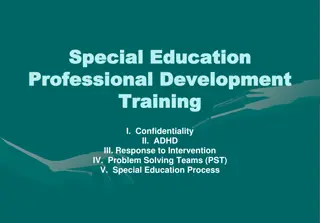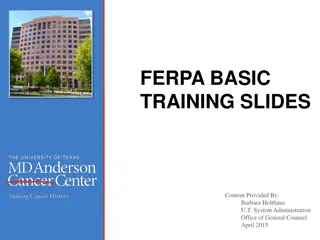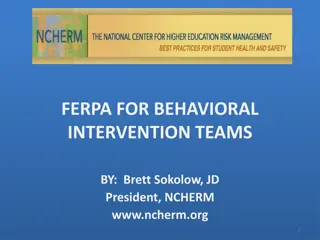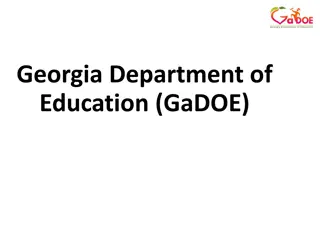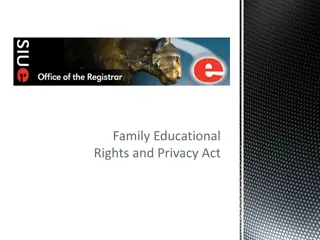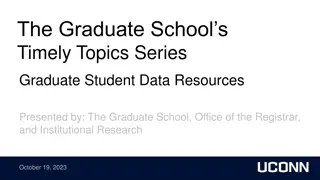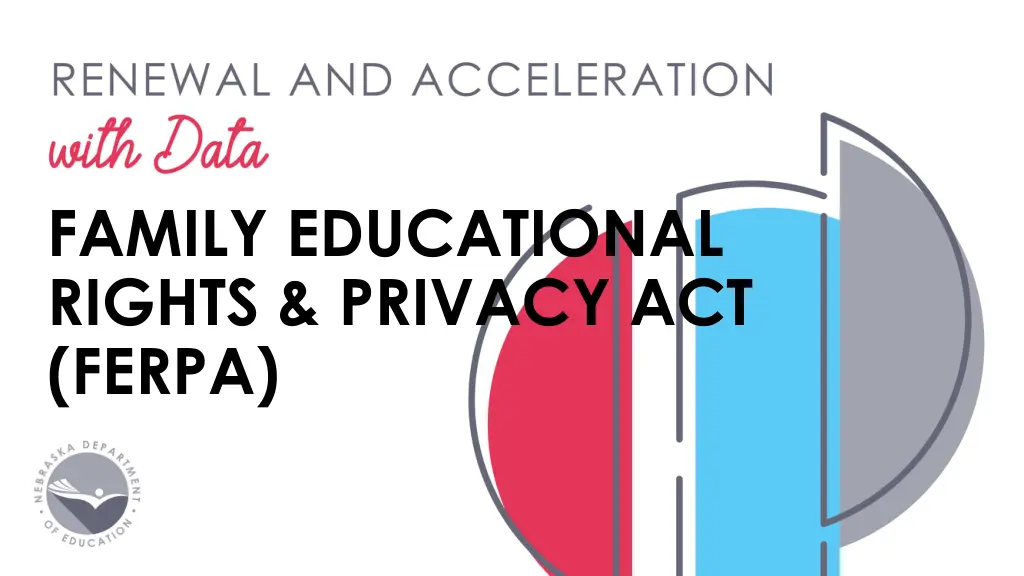
Understanding FERPA: Key Provisions and Student Rights
Explore the Family Educational Rights and Privacy Act (FERPA) including key provisions, student and parent rights, and school duties. Learn about access to education records and exceptions under FERPA.
Download Presentation

Please find below an Image/Link to download the presentation.
The content on the website is provided AS IS for your information and personal use only. It may not be sold, licensed, or shared on other websites without obtaining consent from the author. If you encounter any issues during the download, it is possible that the publisher has removed the file from their server.
You are allowed to download the files provided on this website for personal or commercial use, subject to the condition that they are used lawfully. All files are the property of their respective owners.
The content on the website is provided AS IS for your information and personal use only. It may not be sold, licensed, or shared on other websites without obtaining consent from the author.
E N D
Presentation Transcript
FAMILY EDUCATIONAL RIGHTS & PRIVACY ACT (FERPA)
FAMILY EDUCATIONAL RIGHTS & PRIVACY ACT (FERPA) Title 34, Code of Federal Regulations (CFR), Part 99
A. Key Provisions/Defs. SCOPE & APPLICATION what are these and why do they matter? C A R : Challenge, Access, Release Federal law/rules on education records that apply to any K-12 school that receives federal funds from U.S.D.E. in any manner Hammer = U.S.D.E. has authority to pull funding for policy or practice that violates FERPA. 3
A. Key Provisions/Defs. Overview Divided into 5 subparts Initial key is to apply crucial definitions to fact set to determine if FERPA applicable *educational agency/institution? *education record? *personally identifiable information? *directory information? 4
B. Student & Parent Rights Under FERPA CAR- a parent must be given the opportunity to inspect and review the education records of their child. -copies, fees -time (state vs. FERPA) -interpretations/explanations -students rights (state vs. FERPA) -former students 5
C. School/District Duties & Responsibilities Under FERPA Annual parental rights notification -parent -notify -disclosures within school system Directory information designation 6
D. Issue of Access to/Release of Student Education Records (CAR) The First Commandment: A school cannot disclose personally identifiable information from an education record (PIIFER) of a student w/o the written consent of the parent /eligible student* *Subject to over 20 exceptions in FERPA 8
D. Access to/Release of Records -Disclosure w/o Consent (the exceptions) FERPA permits 20+ instances of disclosure of PIIFER without the required consent, BUT state law (79-2,104) used to prohibit disclosure to all but a narrower category of persons until passage of LB 549 in 2009. Consider possibility of redaction first 9
D. Access to/release of records -Disclosure w/o consent (the exceptions) a) School officials within your institution with legit. educational interest b) Officials of another school/postsecondary inst. where the student seeks to enroll/has enrolled c) U.S. Atty. Gen, U.S. Secretary of Ed., state/local education authorities but only when these offices need PIIFER in connection with an audit or evaluation of a publicly supported education program, or for enforcement of federal legal requirements of such program. 10
D. Access to/release of records -Disclosure w/o consent (the exceptions) For individual student aid purposes where the student has applied for aid To organizations (private and public) conducting certain types of studies for or on behalf of educational agencies In response to a lawfully issued subpoena or court order, but must first notify parent/eligible student in writing 11
D. Access to/Release of Records -Disclosure w/o Consent (the exceptions) To a court if the school initiates action against parent/student or if parent or student initiates action against school Directory information To parents of an eligible (18+) student when that student still a dependent for IRS tax purposes. To student themselves Appropriate parties in health or safety emergency when necessary USA amendment eff. 1/4/13 can release to child welfare workers w/o consent or prior notice. 12
New State Law 2013 Approved by the Governor April 3, 2013 Introduced by Cook, 13. LEGISLATIVE BILL 262 FOR AN ACT relating to education; to amend section 79-2,104, Revised Statutes Cumulative Supplement, 2012; to provide duties relating to sharing of student data, records, and information; to provide for rules and regulations; and to repeal the original section. (4) The Legislature finds and declares that the sharing of student units, learning communities, and the State Department of Education, to the fullest extent practicable and permitted by law, is vital to advancing education in this state. Whenever applicable law permits the sharing of such student data, records, and information, each school district, educational service unit, and learning community shall comply unless otherwise prohibited by law. The State Board of Education shall adopt and promulgate rules and regulations providing for and requiring the uniform sharing of student data, records, and information among school districts, educational service units, learning communities, and the department. 13
D. Access to/Release of Records 3. Death USDE takes position that FERPA rights die with student, but what about when student dies a minor and parents survive student, is parental consent needed? Probably (FPCO & at least one case). 14
D. Access to/release of Records Re-disclosure Party to whom PIIFER disclosed cannot in turn disclose without consent again unless at time of first disclosure there was a written understanding between the parties that the recipient may make further disclosures, to whom the disclosure may be made, and what their educational interest is. Also, re- disclosure must be a disclosure allowed by FERPA consent exceptions. 15
D. Access to/Release of Records 3. School Level Procedures Designate a data steward Written policies Advance written consent for known future disclosures that are not or may not be within FERPA exceptions 16
D. Access to/Release of Records 4. Maintaining a Record of Access Must record all disclosures w/o consent in that student s file (name, legit. ed. interest, date, who disclosed and who recording) Should record even disclosures with consent and record denials +keep written consents and your written denials on file 17
D. Access to/Release of Records 5. FERPA & SPED FERPA incorporated into SPED Act Additional privacy protections Unlike FERPA, provides for a private right of action ($law suit) for unauthorized disclosures. 18
D. Access to/release of records 5. NCLB Changes Required transfer of disciplinary records for public schools Military recruiters get names, addresses and ph. # s regardless of d.i. policy, but opt-out applies Annual notice about military recruiter provisions 19
E. Process for Amending an Ed. Record (CAR) Parent or eligible student has right to ask for amendment based upon belief a record is (i) inaccurate; (ii) misleading; (iii) in violation of privacy rights. Must respond in reasonable amount of time What this does not include (grades per se) If denied, must inform of right to hearing 20
E. Enforcement of FERPA USDE s FPCO policy or practice of violating FERPA, but FPCO indicates lesser standard Penalties: withhold further funding, cease and desist order, terminate all federal funding State: Rule 27 No private right of action under FERPA 21
28-728. Legislative findings and intent; child abuse and neglect investigation team; child advocacy center; child abuse and neglect treatment team; powers and duties. (1) The Legislature finds that child abuse and neglect are community problems requiring a cooperative complementary response by law enforcement, child advocacy centers, prosecutors, the Department of Health and Human Services child protective services division, and other agencies or entities designed to protect children. It is the intent of the Legislature to create a child abuse and neglect investigation team in each county or contiguous group of counties and to create a child abuse and neglect treatment team in each county or contiguous group of counties. (3) Each county attorney or the county attorney representing a contiguous group of counties is responsible for convening the child abuse and neglect investigation team and ensuring that protocols are established and implemented. A representative of the child advocacy center assigned to the team shall assist the county attorney in facilitating case review, developing and updating protocols, and arranging training opportunities for the team. Each team must have protocols which, at a minimum, shall include procedures for: (a) Conducting joint investigations of child abuse and other child abuse and neglect matters which the team deems necessary; (b) Ensuring that a law enforcement agency will participate in the investigation; (c) Conducting joint investigations of other child abuse and neglect matters which the team deems necessary; (e) Reducing the risk of harm to child abuse and neglect victims; (f) Ensuring that the child is in safe surroundings, including removing the perpetrator when necessary; (g) Sharing of case information; (h) How and when the team will meet; and (i) Responding to drug-endangered children. (4) Each county attorney or the county attorney representing a contiguous group of counties is responsible for convening the child abuse and neglect treatment team and ensuring that protocols are established and implemented. 22
28-730. Records and information; access; disclosure; limitation; review of cases; immunity; violation; penalty. (1) Notwithstanding any other provision of law regarding the confidentiality of records and when not prohibited by the federal Privacy Act of 1974, as amended, juvenile court records and any other pertinent information that may be in the possession of school districts, law enforcement agencies, county attorneys, the Attorney General, the Department of Health and Human Services, child advocacy centers, and other team members concerning a child whose case is being investigated or discussed by a child abuse and neglect investigation team or a child abuse and neglect treatment team shall be shared with the respective team members as part of the discussion and coordination of efforts for investigative or treatment purposes. Upon request by a team, any individual or agency with information or records concerning a particular child shall share all relevant information or records with the team as determined by the team pursuant to the appropriate team protocol. Only a team which has accepted the child's case for investigation or treatment shall be entitled to access to such information. (2) All information acquired by a team member or other individuals pursuant to protocols developed by the team shall be confidential and shall not be disclosed except to the extent necessary to perform case consultations, to carry out a treatment plan or recommendations, or for use in a legal proceeding instituted by a county attorney or the Child Protection Division of the office of the Attorney General. Information, documents, or records otherwise available from the original sources shall not be immune from discovery or use in any civil or criminal action merely because the information, documents, or records were presented during a case consultation if the testimony sought is otherwise permissible and discoverable. Any person who presented information before the team or who is a team member shall not be prevented from testifying as to matters within the person's knowledge. (4) A member of a team who publicly discloses information regarding a case consultation in a manner notconsistent with sections 28-728 to 28-730 shall be guilty of a Class III misdemeanor. Source: Laws 1992, LB 1184, 3; Laws 1996, LB 1044, 75; Laws 2006, LB 1113, 26. 23

